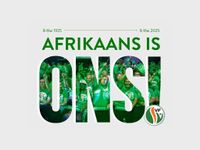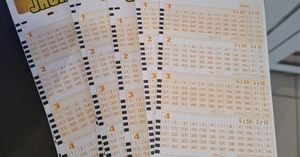Today, May 8, 2025, marks the centennial of the recognition of Afrikaans as an official language in South Africa, a significant milestone celebrated by Afrikaans speakers across the nation. This event, which occurred on May 8, 1925, culminated from a long journey filled with sacrifices and struggles, reflecting the deep love and commitment Afrikaans speakers have for their language.
The recognition of Afrikaans as an official language was not merely a bureaucratic decision; it symbolized a cultural and political struggle that had been brewing since 1875, when the "Genootskap van Regte Afrikaners" (Association of Actual Afrikaners) was founded. This organization aimed to promote the Afrikaans language and culture amidst a backdrop of English dominance. The struggle intensified through various historical events, including two freedom wars that fueled Afrikaner nationalism and the desire for a distinct identity.
In the early 20th century, the landscape of language in South Africa was marked by a fierce battle between Afrikaans and English. The Union of South Africa in 1910 recognized English and Dutch as official languages, but Afrikaans speakers felt marginalized. The literary contributions of figures like C.J. Langenhoven, poets such as Totius and Louis Leipoldt, and publications like "Die Burger" were instrumental in establishing Afrikaans as a cultural and intellectual language.
Persistent political pressure from key figures, including J.B.M. Hertzog and D.F. Malan, ultimately led to the amendment of the Official Languages of the Union Act in 1925, granting Afrikaans official status alongside English. This victory was a significant moment for Afrikaans speakers, yet the journey towards acceptance and equality continued.
Fast forward to the present day, and the status of Afrikaans is once again under scrutiny. In 1994, with the dawn of a new political era, the African National Congress (ANC) and even the Democratic Alliance (DA) proposed that English should be the only official language of South Africa. Despite the establishment of twelve official languages, Afrikaans has struggled to maintain its position.
According to the latest statistics, by the end of 2024, only 1,303 of the approximately 25,000 schools in South Africa were still Afrikaans single-medium schools, a staggering drop of 15% from 2012 when there were 1,531 such schools. This decline raises concerns about the future of Afrikaans in education, as the BELA Act, particularly clauses on admissions and language policy, may further threaten Afrikaans schools under the guise of promoting “equality and accessibility.”
As the Freedom Front Plus has pointed out, the BELA Act could serve as a tool to phase out Afrikaans in favor of dual-medium education, undermining the constitutional right of Afrikaans speakers to mother-tongue education. The reality is that the survival of any language depends on its use in higher functions—if Afrikaans loses its presence in books, newspapers, courts, and schools, its status diminishes, leading to fewer parents raising their children to speak it.
The emotional connection to Afrikaans is palpable among its speakers, as illustrated by personal narratives. A contributor to this centennial reflection, who grew up in the Northern Cape, shared their journey with the language, expressing a profound sense of identity tied to Afrikaans. They recounted how their grandmother, despite speaking Tswana, communicated with them in Afrikaans, highlighting the language's role in their upbringing.
Reflecting on the historical context, the author noted the challenges faced during the Soweto uprising in 1976, when Afrikaans was imposed as a medium of instruction in schools, leading to widespread resistance. This event marked a turning point in the perception of Afrikaans, which became associated with oppression and discrimination.
Yet, as the author poignantly stated, Afrikaans has evolved. It is no longer solely the language of the oppressor but has become a part of the broader South African identity. It is a vernacular language, rich in cultural heritage, and belongs to anyone who wishes to speak it.
Celebrating the centenary of Afrikaans as an official language is not just about recognizing its past but also about acknowledging its future. The language has matured, embracing diversity and inclusivity. Writers like E.K.M. Dido, the first black author to publish a novel in Afrikaans, and contemporary voices influenced by hip-hop culture are redefining what it means to speak Afrikaans today.
The struggle for Afrikaans continues, but so does the love for the language. As the author emphasized, “Afrikaans is my language,” a sentiment echoed by many who cherish its beauty and complexity. They envision a future where Afrikaans thrives, rich and diverse, layered with the experiences of all its speakers.
As we look forward to the next century, the hope is that Afrikaans will continue to flourish, not just as a language but as a living testament to the resilience and creativity of its speakers. In celebrating Afrikaans, we celebrate the stories, struggles, and triumphs of those who have fought for its place in South Africa's cultural tapestry.




